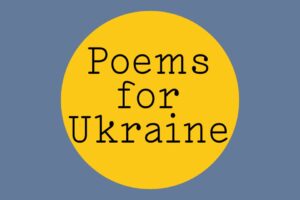Desert Island War Poems
Poets have always responded to war by writing poetry — it’s what we do. Following the invasion of Ukraine by Russia on 24th February this year people started sending The Friday Poem their poems about the war — poems about resistance, poems of protest, and poems about specific individuals affected by the fighting. These are stories of courage, grief and hope. We decided to publish some every week as Friday Poems for Ukraine. Here’s ‘Desert Island War Poems’ by Roy Marshall. Slava Ukraini!
Desert Island War Poems
Any comment from me on this latest war feels inadequate. My words feel too small, incapable of expressing anything in the face of such violence, terror and horror.
I was lucky to visit Ukraine in 1993, to drive up from Romania on a road trip that took in Kyiv, Lviv and lots of smaller conurbations. We ate simply, met locals, drank vodka, saw ex-Soviet warplanes on plinths and elderly women in headscarves driving oxen-pulled carts. We travelled large distances every day for two weeks, some of it over vast open Ukrainian plains on our way back to England via Poland, Germany and Holland.
It is particularly disturbing to recognise places I visited on the news, although of course this shock of recognition is nothing in comparison to that of the journalist I saw on television who was shown live footage of a shelled building that had been her family home.
Sadly, it seems, poems about war never go out of date. The title of the piece below is meant ironically; who would want to remember the worst that humans can do to each other when far away from them? It is offered as a simple tribute to, and reminder of, some of the poems I know where, despite the often seemingly unspeakable subject matter, the poet has been able to find words to explore some of the complexities and simplicities of war.
Desert Island War Poems
I’d like to take Les Murray’s ‘The Burning Truck’
for its velocity, the sense of the sudden, total loss
of safety, for its fighter planes that “came in off the sea
and didn’t rise” so fast “the crockery they shook down /
off my kitchen shelves was spinning in the air /
when they were gone.” And for the burning truck itself,
“canopy-frame a cage / torn by gorillas of flame,”
and the “wild boys of the street”, “disciples” who ran
after it, and “out of the world”. And Keith Douglas.
‘How to Kill’, or ‘Vergissmeinnicht’. Either of these,
for the grace with which they describe the antithesis
of grace. And Isaac Rosenberg, whose “droll rat”
at break of day, passes between the lines
to touch the hands of soldiers on both sides;
the rat who would be killed if “they knew”
of its “cosmopolitan sympathies”. And Owen;
probably ‘Futility,’ if I have to choose, for its
tenderness. And ‘The Colonel’, by Carolyn Forché,
which puts ice in veins. And ‘More Light!, More Light!’
by Anthony Hecht, which I would like to never
read again. And all of David Jones ‘In Parenthesis’.
And ‘The Foot’, by Don Paterson, a poem that begins
“I have no words so here are the no words”
which is what I have today.
Links to poems mentioned
‘The Burning Truck’ by Les Murray
‘How To Kill’ by Keith Douglas
‘Vergissmeinicht’ by Keith Douglas
‘Break of Day in the Trenches’ by Isaac Rosenberg
‘Futility’ by Wilfred Owen
‘The Colonel’ by Carolyn Forché
‘More Light! More Light!‘ By Anthony Hecht
In Parenthesis by David Jones, Faber and Faber, 1937
‘The Foot’ by Don Paterson. 40 Sonnets, 2015, Faber and Faber

